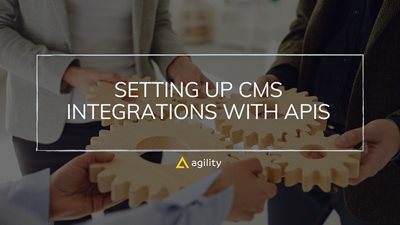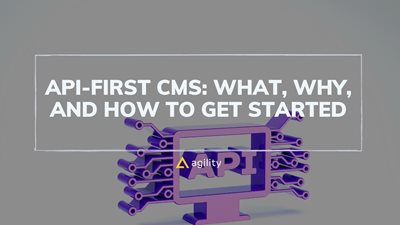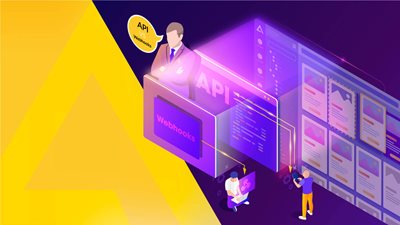Setting Up CMS Integrations With APIs
Different CMS platforms come with different ways of setting up and configuring system integrations.

Integrating your web CMS with third-party systems is essential when connecting the different areas of your business that you've already established and growing those areas where you wish to expand.
However, different CMS platforms come with different ways of setting up and configuring system integrations, so before picking a web CMS, it's essential to consider the implications for your business processes and your site's future expandability.
In this article, we outline the three main aspects we think you should keep in mind when it comes to CMS integrations so that you can be best prepared to make a choice that will serve you not only now but in the years to come.
It's not about connecting; it's about configuring.
System integrations are typically set up via Application Programming Interfaces (APIs), connections that allow your different applications to talk to each other. However, some integrations are more accessible to connect than others, depending on whether they're hosted on the same server, on the cloud or internally. Some standard protocols make it much easier for disparate applications and services to communicate, for example, those running over HTTPS, using REST services with JSON support and OAuth or other token-based authentication.
But setting up integrations isn't just about connecting. It is also about configuring. 99% of the integration setup process involves customizing and configuring it specifically within your web CMS's features. For example, some CMS platforms provide webhooks, enabling particular events to trigger API calls to your systems. These webhooks, therefore, allow you to define specific parameters in which you would like business processes with integrations to happen.
The key is finding a CMS that allows you to configure your integrations precisely in the way you need them. For example, when it comes to a CRM such as Salesforce, which is very configurable, your CMS should allow you to implement custom business processes across your website and CRM. This will enable you to keep a very well-defined lead generation process. And it will also allow you to define particular processes; for example, do you want leads to go straight into Salesforce, or would you prefer them to go to your CMS first for approval? Would you like to set specific lead personas depending on their buying process? Do you need notifications every time an order goes through a status update? The more configurable your CMS is, the more specific you can make these processes.
Trust the cloud
If the above sounds appealing and you are looking for a highly configurable web CMS, your best bet is to find a cloud-based CMS, as these platforms are best positioned to provide the types of integrations mentioned above.
Cloud-based platforms such as Azure are particularly great solutions for CMS configuration because they have very well-defined ways of, for example, getting through firewalls, in contrast to platforms such as Dynamics that can be, and often are, hosted internally. Since Azure is cloud-based and offers centralized regions and hardware deployments, it can evolve quickly to solve business problems, leading to new features or expansions to feature sets. So, as Azure grows, your website and apps can develop and grow.
In contrast, if a website is hosted inside someone's infrastructure, data coming in and out will generally follow a strict set of rules.
Let your website grow with your business.
Ultimately, the best web CMS platform for you will allow your website to grow with your business mid-to-long term. Choosing a cloud-based and highly configurable solution is the first step, but you should also consider finding a solution that allows you to add new integrations and features over time.
As we mentioned, platforms such as Azure are great at connecting you to a wide variety of APIs, so the combination of Azure and a highly configurable CMS is ideal. As long as integrations have a well-defined API, Azure allows you to set up new integrations easily. All you have to do is build the API, and the system will easily integrate. A single API may also allow you to connect to multiple systems, reducing development time.
In comparison, other platforms require you to use a plugin or module to configure integrations, which generally have a predefined way of connecting your systems, meaning they can only do a particular thing. Depending on your needs, this may require additional customization or multiple plugins to carry out your specific business process. This, of course, comes with extra development time and costs, providing little flexibility and adaptability to your unique needs. The result is a platform that places little emphasis on growth and evolution, which can lead your website to get stuck in the mid-to-long term.
What you need is a platform that's forwards- as well as backwards-compatible and with a strong emphasis on changing and growing along with your business. This means that features that don't work should disappear with time, and those that do should move forward and continue evolving. Only a configurable and cloud-based CMS platform committed to growing and changing along with you will enable you to build a durable and expandable future site.
About the Author

API-first CMS: What, Why, and How to Get Started

API vs SDK vs Webhooks Explained: Various Ways to Power a Headless CMS

